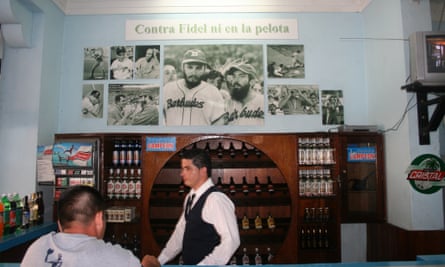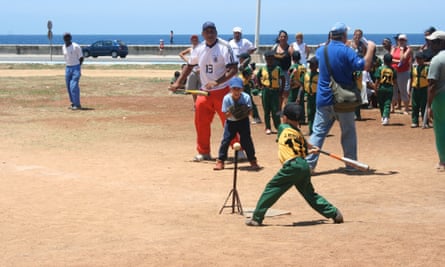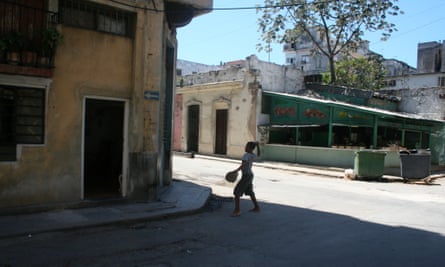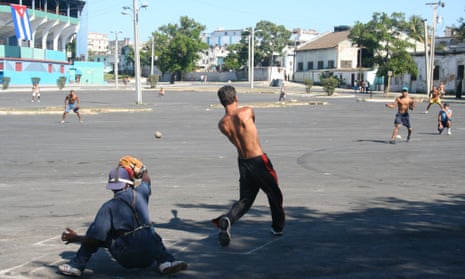With the announcement that relations between the United States and Cuba are on the cusp of a major thaw, the North American sports community is anticipating the possibility of Cuban prospects flooding into Major League Baseball, once they are free to do so.
Of all the lingering questions attached to Wednesday’s events, one thing we do know is that such an opening won’t happen overnight, with factions in Congress vowing to oppose shifts in the US embargo.
Following the historic statements from Presidents Barack Obama and Raul Castro, MLB released a statement saying:
Major League Baseball is closely monitoring the White House’s announcement regarding Cuban-American relations. While there are not sufficient details to make a realistic evaluation, we will continue to track this significant issue, and we will keep our Clubs informed if this different direction may impact the manner in which they conduct business on issues related to Cuba.
That means teams will not be able to do business with Cuba yet – but maybe one day soon. That possibility is more than enough to make baseball fans drool at the prospect of having their own versions of Yasiel Puig, Yoenis Cespedes, Aroldis Chapman or Jose Abreu, Cuban defectors who survived gruesome, dramatic trips to North America by any means necessary, before bringing some of the most dynamic, powerful, exciting and multiskilled play baseball has seen over recent seasons.
Mike Toomey has been a Major League scout for 35 years and covers Colombia, a newer Latin American baseball country just starting to yield players.
“As baseball guys we were dying to get into Cuba,” said Toomey who works as a special assistant to the Kansas City Royals General Manager Dayton Moore, “and I think it’s great for baseball and it’s going to be very interesting. I think you’re eventually going to see [Dominican Republic like] academies in there, no question.”
Should the Cuban baseball frontier open wide, there’s every possibility MLB would seek to mine talent just as it did during the years preceding the revolution. From 1900 to 1959, professional baseball had a healthy presence on the island with the Brooklyn/Los Angeles Dodgers regularly playing games in Cuba and shacking up in Havana for a spring training in 1947.

The Cincinnati Reds had a beloved minor league team in the Cuban capital called the Havana Sugar Kings, while Dodgers and other MLB teams regularly scoured Cuba for players, a process that ended shortly after the rise of Fidel Castro in 1959. The subsequent United States embargo mostly ruled out any future big league teams from doing business inside the communist nation, with the two notable exceptions being the Baltimore Orioles 1999 trip to Havana and Cuba’s partnership in the World Baseball Classic, partially operated by New York based MLB.
With no real working relationship with Cuba to speak of, MLB’s only option was to wait for some of the most talented baseball players in the hemisphere to trickle in via defections.

How exactly MLB doing business in Cuba would change the overall landscape of the sport is unknown. Former Washington Nationals and Montreal Expos president Tony Tavares told the Guardian: “I really don’t have an idea what’s going to happen yet. I mean we’re at the very tip of this ... if it does come, it certainly will make a lot more players available.”
That leads to more questions, one of which is, just how deep is the talent pool of the Serie Nacional de Béisbol anyway? Well, there are known knowns that can help guide us along.
When the Cuban Revolution took place that there were some 300 players who had deals with American franchises, a figure which includes minor league clubs. That’s a lot when you consider that it took several decades for players from the Dominican Republic to start flooding MLB rosters after Ozzie Virgil became the first to suit up in a big league game in 1956.
That’s the kind of stat that makes you think that at least up until the Revolution, Cuban baseball was highly advanced and thus, rather deep. Yet, it’s difficult to say what has happened to the overall talent pool since then.

Cuba gave us the likes of Livan and Orlando Hernandez and Puig, while the Cuban National team has won everything there is to win on an amateur level. There have been sneak peaks of the Cuban team at World Baseball Classic tournaments, another event where the best of the best are representing their nation.
What happens once you get below that elite upper crust is what needs to be discovered. Are there more big time big leaguers, or would they simply create more competition for jobs on the Toledo Mud Hens, Brooklyn Cyclones and Stockton Ports?
“I think Cuba has been right there as far as talent,” said Toomey. “I just think it’s just a matter of player development, and working with these kids, giving them an opportunity on a daily basis where they get repetitions, and instruction. The instruction there now is very good, but I think we just need to have more professional people there that have experience that can go in there and just help them out a little bit more.”
In 2014, 25 Cuban-born players played in the big leagues, which is already a record, breaking the 2013 total of 15. Could an open Cuba eventually get to the level of the neighboring Domincan Republic, which had 83 players on Opening Day rosters? Toomey thinks there’s enough players with exceptional raw tools to have that sort of impact. “I think you’ll see Major Leaguers, guys making impact, pretty much as soon as they get here,” he says.
For now however, it’s a waiting game, which allows for the mind to wonder, place carts before horses and dream big.
Given that there are MLB teams in Canada, why not Cuba? I'd love to go to a @mets game in Havana! (Even though they'd def lose.)
— Jonathan Ringen (@JonathanRingen) December 18, 2014
Havana clearly set for MLB expansion in the not-so-distant future. Montreal probably will get ballpark issues settled. Bingo, 2 new teams.
— Lynn G. Henning (@Lynn_Henning) December 17, 2014
The return of the Havana Sugar Kings ? It has a nice ring to it but any Cuban franchise is a long way off - and that’s before you take into account broadcasting deals and ticket pricing in a vastly less cash-rich market. For now, let’s leave the discussions to the politicians.

Comments (…)
Sign in or create your Guardian account to join the discussion